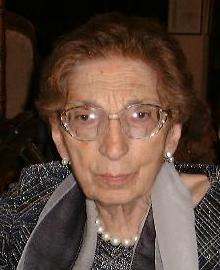María Salas Larrazábal facts for kids
Quick facts for kids
María Salas Larrazábal
|
|
|---|---|

July 2004
|
|
| Born |
María Presentación Salas Larrazábal
22 November 1922 Burgos, Spain
|
| Died | 15 November 2008 (aged 85) Madrid, Spain
|
| Other names | Mary Salas |
| Occupation | Writer, journalist |
María Presentación Salas Larrazábal (born November 22, 1922 – died November 15, 2008) was a Spanish writer and journalist. She was also known as Mary Salas. She focused on teaching adults and was a leader for women in the Catholic faith.
Mary Salas was connected to Catholic Action, a group for Catholic people to take action in society. She was also the first president of the non-profit organization (NGO) Manos Unidas. She played a big part in fighting for equality. In 1960, she helped start the Seminar on Women's Sociological Studies. This group was the beginning of modern gender studies in Spain. In 1986, she also helped create the Women's Studies Forum, which she led.
Contents
Early Life and Studies
María Presentación Salas Larrazábal was born in Burgos, Spain, in 1922. Her father was a general in the army. She studied Philosophy and Literature at university. She earned a degree in Semitic philology, which is the study of Semitic languages. This was a time when very few women went to university. She also studied journalism at the Official School of Journalism.
Working for Change
Mary Salas was a leader in the Catholic Action group for women. She was also in charge of adult education for a worldwide Catholic women's group. This job meant she traveled a lot. She saw how people lived in different parts of the world. These experiences helped shape her writing later on. She also managed one of the few university dorms for girls in Madrid.
Throughout her life, she was deeply involved with Catholic Action. She was a national leader for over twenty years. She also led the Centers of Popular Culture until 1968.
In 1960, she helped create the Seminar on Women's Sociological Studies. She worked with María Laffitte, Lilí Álvarez, Elena Catena, and Consuelo de la Gándara. This group became a center for moderate and intellectual feminism. It was a very early step for modern gender studies in Spain.
Founding Manos Unidas
Also in 1960, Mary Salas was one of the people who started Manos Unidas. She became its first national president. She worked closely with Pilar Bellosillo, who was the only Spanish woman to attend the Second Vatican Council. They were both very important to the World Union of Catholic Women's Organizations.
Mary Salas started the Campaign Against Hunger in Spain. She wrote many of the first articles that shared the ideas of the UMOFC's founding plan from 1955.
In 1968, she traveled to Sub-Saharan Africa with Pilar Bellosillo. Their goal was to help women's issues. They went to Kinshasa, then to the Ivory Coast, Cameroon, and Senegal. There, they trained Catholic leaders in these newly independent countries. Before this, they visited Argentina, Colombia, and Mexico. They gave a one-month course to train leaders, which was paid for by UNESCO.
One of Mary Salas's trips that affected her the most was to India. She wrote in her memories about a terrible famine there. She said, "It was an agonizing situation; many people were dying." Her group collected a lot of money to help. They wrote to Indira Gandhi, who was the Prime Minister of India. They asked what was needed most. They were told that rice and vehicles to carry aid from the port of Bombay were needed.
In 1977, she ran for a seat in the Spanish Parliament. She represented Burgos for a left-wing political party.
She wrote often for the magazines Ecclesia and Vida Nueva. She was also a regular writer for the magazine Signo. She stopped writing in June 2008 because she became ill.
Fighting for Women's Rights
In 1959, Mary Salas published her first book, Nosotras, las solteras (We, the Single Women). This book was for women who chose not to marry. Her biographer explained that she wanted to make this choice seem honorable. She wanted to move away from the old idea of "rancid spinsters" that appeared in many jokes.
In 1960, she helped start the Seminar on Women's Sociological Studies. This group was supported by María Laffitte. It was a groundbreaking group for gender and equality studies in Spain. It helped connect moderate feminist groups with more determined feminist groups.
Pope Pius XII encouraged her work for women's rights. Pedro Miguel Lamet remembered what was said at a tribute to her: "In the 1950s, we encouraged Catholic women to be active everywhere. He wanted to show a Christian feminism. He saw the strength of other feminist movements. He said women had a lot to do to change a wild world into a human one."
In 1986, Mary Salas, along with Pilar Bellosillo, Dolores Aleixandre, and Marifé Ramos, helped create the Women's Studies Forum (FEM). This was a place for Christian women to explore new ideas with European groups.
Awards and Honors
- In 1996, she received an award from Alandar magazine. This was for her hard work for women's rights.
- In 2001, her name was part of an exhibition. It was called "100 women of the 20th century who opened the way in the 21st century." The Women's Council of the Community of Madrid organized it.
- In 2004, she won the Bravo! award from the Episcopal Conference of Spain. This was for her long career in writing and journalism. She worked to promote the dignity and role of women in society and the Church. She did this with a strong Christian commitment.
See also
 In Spanish: María Salas Larrazábal para niños
In Spanish: María Salas Larrazábal para niños

